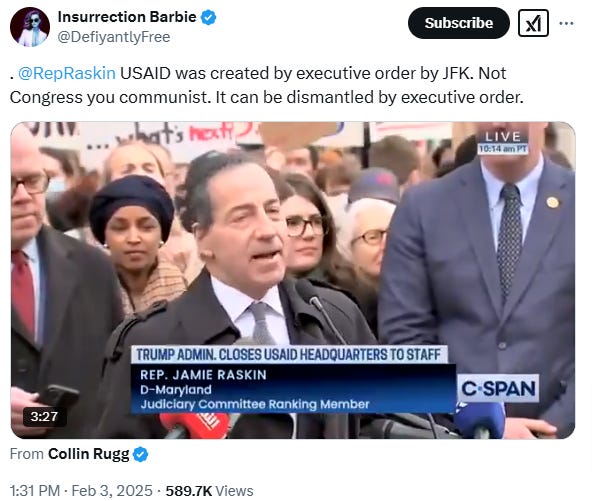No, USAID can’t be legally abolished by presidential action
Meanwhile, Congress is somewhat functional.
X.com was alight late yesterday with MAGA-ites crowing that the President can dismantle United States Agency for International Development (USAID). Some of the gloating was fueled by a fact—the agency was created by executive order in 1961. Ergo, they reasoned, the president could croak it with his pen.
But these folks did not bother to do their homework.
If they had, they would have learned Congress later enacted legislation to clarify USAID’s status. Just look at 22 U.S.C. 6501 et seq. and you will see USAID right there in permanent law.
Don’t believe me? Then read what the Congressional Research Service wrote.
Because Congress established USAID as an independent establishment (defined in 5 U.S.C. 104) within the executive branch, the President does not have the authority to abolish it; congressional authorization would be required to abolish, move, or consolidate USAID…. Section 1413 of the Foreign Affairs Reform and Restructuring Act of 1998, Division G of P.L. 105-277, established USAID as an “independent establishment” outside of the State Department (22 U.S.C. 6563). In that act, Congress provided the President with temporary authority to reorganize the agency (22 U.S.C. 6601). President Clinton retained the status of USAID as an independent entity, and the authority to reorganize expired in 1999. Congress has not granted the President further authority to abolish, move, or consolidate USAID since. (Bold added by author.)
Whether USAID should be reformed or abolished is not something I take a position on. If Trump wants to defund USAID, all he needs to do is to ask the GOP-controlled Congress to put a zero next to the USAID portion of the State Department's appropriations bill. Voila—it would be gone and gone legally with no possible court challenge.
But I don’t have a whole lot of respect for folks who aid and abet illicit presidential unilateralism by spewing nonsense. We are a nation of laws—aren’t we?
Wither oversight? Whither the republic?

President Trump plainly aims to move fast and break things in the process.
But what should happen if he overreaches? Well, in our system the First Branch should push back. So far, it is not clear it is doing much of that. Trump fired inspectors general without providing warning, and certainly the pause on grants-in-aid funding and USAID situation do not look like an executive who is taking care that the law be faithfully executed, as the Constitution instructs.
That leaves corrective pushback from the judiciary. So, what happens if a court deems illegal an inspector general’s firing or the refusal to spend appropriated funds? Well, I can’t help but recall the old and probably fake Andrew Jackson quote, “John Marshall has made his decision; now let him enforce it.” If Trump ignores a court’s order, What can the court do? Not much.
In the end, then, this leaves it to the the voters, who can voice their displeasure at the President’s party in the midterm elections in November of 2026.
The Founders did a fine job of fracturing power in hopes of averting the growth of an out-of-control executive. But no system is full-proof. Representative government, James Madison observed, requires a level of virtue among leaders and citizens alike.
Nonetheless, the new Congress is doing bipartisan things
Gabe Fleisher reports that “House passed nine bills… all of them with significant bipartisan support.” He also notes:
“As the wildfires in California continue to rage, the House passed the Fix Our Forests Act, which would allow wildfire protection and forest management projects to receive quicker approval by expediting environmental reviews. The bill passed 279-141, with 64 Democrats in favor…. The chamber also voted 359-62 to approve the Continued Rapid Ohia Death Response Act, which would commit federal resources to combating Rapid Ohia Death, a fungal disease that is quickly ravaging Hawaiian forests, and unanimously for the ACRES Act, which would mandate accurate reporting on the work agencies are doing to combat wildfires. (Per NBC News, the Forest Service has been overstating its work in the area for decades.)
Do consider subscribing to Gabe’s newsletter, which regularly highlights the bipartisan work getting done on the Hill.
Figure of the Week: The 119th Congress is the most racially and ethnically diverse to date

Pew Research Center observes: “Just over a quarter (26%) of voting members in the U.S. Congress identify as a race or ethnicity other than non-Hispanic White, making the 119th Congress the most racially and ethnically diverse to date. In continuation of a long-running trend, this is the eighth Congress to break the record set by the one before it.”
ICYMI: Fascinating reads
Ed Whelan, The Mystery of Oliver Wendell Holmes Jr.'s Recess Appointment, Confirmation Tales.
Joshua Tait, Edward C. Banfield and What Conservatism Used to Mean, The Bulwark.





Thanks for detailing how Congress EVENTUALLY "authorized" USAID through appropriations. USAID was created by executive order (John F. Kennedy, 1961). Like you, I take no position on whether it should be abolished or run, and I'm aware of several excellent agriculture-related grants over the past several years. Arguably, those programs could also be run by the USDA. It's an interesting debate.
Great job, as always!